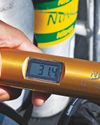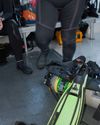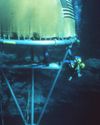How to get great underwater shots after dark

The first hurdle of night diving is to actually do it. Getting a beer at the bar and calling it a day is often more tempting than jumping into the water again. But once in, there is almost always one encounter or one shot that makes forgoing that beer worth it. For the best results, here are some important considerations to take with you.
The first and most important thing to bring is a torch. One for you and one for your camera. It’s equally important to be able to focus underwater at night as well as to communicate with your dive buddy or the boat that is going to pick you up afterwards. Underwater photographers often think that they have enough lights as they have their focus light or pilot lights built into the strobes. But when the focus light is on throughout the dive and the strobes have emptied out by the end, you face the risk of not having any light at the surface, which can be a serious safety hazard. It’s always better to bring a second, handy dive torch with you as a backup.
Regarding the focus light, wide and soft light will do the job well. Ideally, it should not be too strong or dimmable to low power to avoid scaring the animals away with the light. If you have the option of using a red light, it could be very useful for animals that are easily scared, but take note that the landscape will be set to a monochrome scene and it makes finding animals more difficult compared to using white light.
MACRO PHOTOGRAPHY
Esta historia es de la edición Issue 01 - 2018(111) de Scuba Diver.
Comience su prueba gratuita de Magzter GOLD de 7 días para acceder a miles de historias premium seleccionadas y a más de 9,000 revistas y periódicos.
Ya eres suscriptor ? Conectar
Esta historia es de la edición Issue 01 - 2018(111) de Scuba Diver.
Comience su prueba gratuita de Magzter GOLD de 7 días para acceder a miles de historias premium seleccionadas y a más de 9,000 revistas y periódicos.
Ya eres suscriptor? Conectar

The Making Of A World Record-Breaking Diver
Descending more than 300 metres into the depths of the ocean may sound like a daunting prospect to even the most seasoned diver. But to one man, it was just another a challenge that he set for himself to see how far he was able to push the envelope.

Risk Mitigation: Hose Failure
An unexpected outcome

Top 10 Wrecks Of Asia-Pacific
We present a curated list of the top 10 most famous wrecks found in the Asia-Pacific region, listed in no particular order

From The Medical Line: Diving After DCS
DAN medical information specaialists and researchers answer your dive medicine questions

Cave Exploration: Beginning With The End In Mind
Building complex adventures on simple skills

Dive Slate: Stay Safe On Board
When preparing for a dive, safety is at the top of the list – checking gear, learning potential site hazards and discussing procedures with your divemaster or buddy.

101 Tips On Becoming A Better Tek Diver
Technical diving takes divers beyond the typical recreational scuba diving limits, opening up many new and exciting possibilities.

TECHNICAL DIVING TIMELINE (1660–1999)
It’s fair to say that the emergence of “technical diving” in the late 1980s, that is, the introduction of mixed gas technology, and later mixed gas rebreathers to the sport diving community, represented the culmination of hundreds of years of scientific discovery and technological development.

FLYING AFTER DIVING
From the Safety Stop

DIAGNOSING DECOMPRESSION ILLNESS
Incident Insight